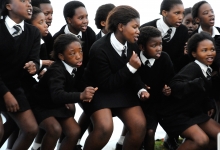Singing Against Apartheid: An Audio Essay

Based on ethnographic field research conducted in 2008, this audio essay discusses the integral role of song in the South African anti-apartheid movement (1948-1994) as seen through the eyes of two black women. Gloria Piliso and Nobulumko Bongco, both Xhosa residents of King Williams Town, South Africa, experienced apartheid and participated in the anti-apartheid movement. In an increasingly dangerous and violent political atmosphere, music and song functioned vitally as a method of protest against the increasing stranglehold of the racist government. At times, song even became a weapon, famously moving armed militia men to massacre a crowd of unarmed schoolchildren who were performing the toyi-toyi, a form of dance protest, during the Soweto Uprising in 1976. Additionally, freedom songs were also used to bond together, comfort, and communicate between blacks from different tribal backgrounds. Now that apartheid is over, the same songs function as community memory and are often sung at funerals and memorial services. This audio essay, which features musical and interview excerpts from the authors' field research, illuminates the vital role of music in the struggle to end the oppressive apartheid regime in South Africa.
Listen to "Singing Against Apartheid" by A. Atandi Anyona and Ryan Koons:

A. Atandi Anyona is an environmental consultant and cultural advocate from Nairobi, Kenya. He holds degrees in Africana Studies and Environmental Science from Dickinson College and currently works for a community development consultancy.
Ryan Koons is an ethnomusicologist, oral historian, and documentary filmmaker. He holds a degree in music history from Dickinson College, and is currently a graduate student at the University of California, Los Angeles.
---
Ethnomusicology Review Vol. 17 arrives November 1, 2012
Publish your multimedia essay on the Sounding Board by sending an e-mail to emreview@ucla.edu with "Sounding Board Submission" in the subject heading.





